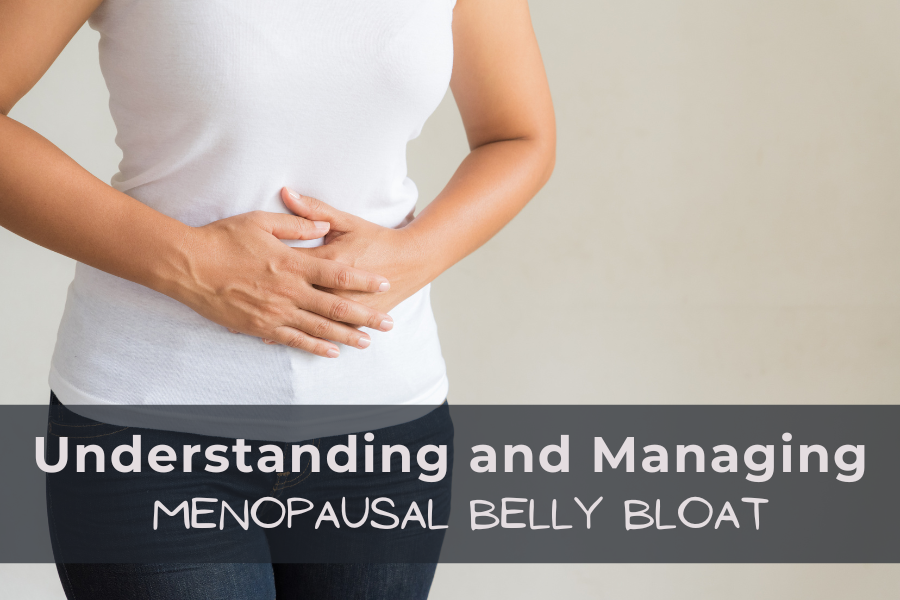Menopausal Belly Bloat - Tips for Management
Are you struggling with menopause belly bloat?
Menopause is a natural phase in a woman's life, marking the end of her reproductive years.
While it comes with various changes, one of the most frustrating symptoms women often experience during menopause is belly bloat.
This symptom might not be as apparent as night sweats, hot flashes, or sleeplessness, especially if you have a history of digestive issues leading up to your transitional years.
This blog will explore what causes menopause belly bloat and provide practical tips on managing it effectively.
What is Menopause Belly Bloat?
Belly bloat, also known as abdominal bloating, is a condition characterized by the uncomfortable sensation of fullness and tightness in the abdominal area.
It's a bit like experiencing a persistent, distended feeling in your midsection.
This sensation can be quite distressing, causing your abdomen to feel overly swollen and uncomfortable.
While bloating can affect individuals of all ages, menopausal women tend to be especially susceptible to it due to the hormonal changes that occur during this life stage.
The shifts in hormone levels, particularly the decline in estrogen, can disrupt the body's natural balance.
Consequently, leading to increased water retention and digestive irregularities, which in turn contribute to the occurrence of belly bloat.
Hormonal Changes and Belly Bloat
Throughout the menopausal transition, a woman's body undergoes major fluctuations in its hormonal composition.
One of the most notable changes is the gradual decline in estrogen levels, a hormone that plays a pivotal role in regulating various bodily functions.
Therefore, as estrogen levels diminish, it can significantly impact the body's delicate equilibrium involving water retention and digestion.
These hormonal fluctuations can significantly contribute to the development of bloating, and here's why:
5 Practical Tips for Managing Menopausal Belly Bloat
Now that we understand why menopause belly bloat occurs, let's explore some practical tips to help manage and alleviate this uncomfortable symptom.
Stay Hydrated
Staying hydrated to reduce belly bloat might seem counterintuitive at first, but it's an essential strategy.
When the body lacks adequate hydration, it can enter a state of water retention, exacerbating the feeling of fullness and bloat.
Therefore, by consistently drinking enough water, you signal to your body that it doesn't need to retain excess fluids, ultimately leading to a reduction in bloat.
Additionally, proper hydration keeps the digestive system functioning smoothly.
Which prevents the slowdown of digestion, which can cause abdominal discomfort and bloating.
Furthermore, it helps balance sodium levels by flushing out excess sodium through urination, further reducing water retention and its associated discomfort.
So, despite initial perceptions, reaching for that glass of water can be a simple and effective way to alleviate belly bloat and promote overall comfort.
mindful eating
Embracing mindful eating habits can have a significant impact on your digestion and help alleviate the discomfort of bloating.
When you slow down during meals and take the time to chew your food thoroughly, you not only savor your meal more but also promote better digestion.
Chewing your food properly initiates the breakdown of nutrients and enzymes in your saliva, making it easier for your stomach to process the food.
Moreover, this deliberate approach to eating reduces the chances of swallowing excess air, a common culprit in bloating.
By adopting this mindful eating practice, you can enhance your overall digestive health, minimize bloating, and enjoy a more comfortable and satisfying mealtime experience.
Fiber-Rich Diet
Incorporate fiber-rich foods like fruits, vegetables, and whole grains into your diet.
Fiber aids digestion by promoting regular bowel movements and preventing constipation, a frequent contributor to bloating.
By incorporating these foods, you can support a healthier digestive system and reduce the discomfort associated with abdominal bloating.
Limit Gas-Producing Foods
Certain foods can lead to gas buildup in the digestive system, which can contribute to the discomfort of bloating.
These culprits often include beans, broccoli, cabbage, and carbonated drinks.
Beans contain complex sugars that may ferment in the gut, while broccoli and cabbage contain natural sugars and fibers that can be challenging to digest, leading to gas production.
Additionally, carbonated drinks introduce extra air into the stomach, potentially exacerbating bloating.
Therefore, to reduce the likelihood of bloating, consider limiting your intake of these gas-producing foods and opting for alternatives that are easier on the digestive system.
Regular Exercise
Exercise helps by promoting efficient digestion through increased movement in the gastrointestinal tract.
This aids in the timely passage of food and reducing the chances of discomfort.
Furthermore, maintaining a healthy weight through exercise can alleviate the strain on the digestive system.
Which helps to prevent issues like acid reflux and indigestion, which can contribute to bloating.
Additionally, exercise plays a crucial role in reducing stress levels, which is another significant factor behind bloating during menopause.
High-stress levels can disrupt digestion, trigger food sensitivities, and lead to abdominal discomfort.
Regular exercise, especially stress-reducing activities like yoga or meditation, helps to reduce stress.
Indirectly reducing the likelihood of bloating and digestive discomfort in menopausal women.
Conclusion
Menopause belly bloat can be a challenging symptom to navigate.
However, with the right strategies, it's possible to manage and reduce its impact on your daily life.
By staying hydrated, making dietary adjustments, incorporating exercise, and considering medical guidance when needed, you can reclaim comfort and confidence during menopause.
Remember that every woman's experience with menopause is unique, so be patient with yourself and find the strategies that work best for you.
With proper self-care and a supportive healthcare team, you can minimize the discomfort of menopause belly bloat and gain some control over how you feel about yourself and your body.
PRODUCTS I USE
MORE POSTS YOU'LL LOVE
Understanding and Managing Menopausal Belly Bloat

by DR. BIANCA BELDINI
September 3, 2023
This post may contain affiliate links. Please read full disclosure here.





